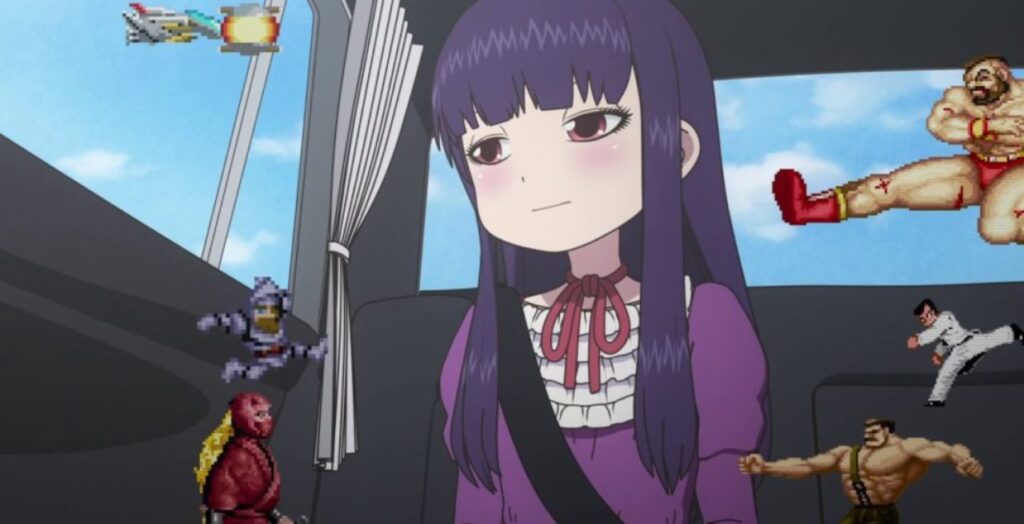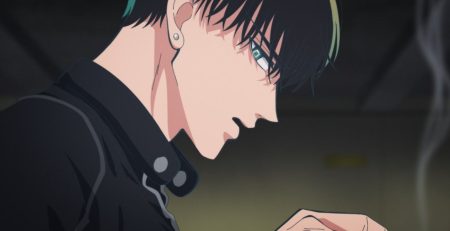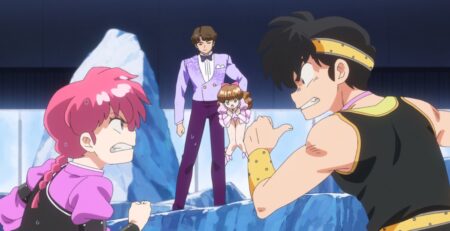Based on the manga of the same name from mangaka Rensuke Oshikiri, Hi-Score Girl is a Netflix Original anime that revolves around the life of gamer Haruo Yaguchi, the arcade gaming scene, and the changes that develop within both over time. The first season of Hi-Score Girl surprised me. It was a tender and adorable love story between a gamer boy and girl that also presented audiences with a historical look at the way that fighting games and the arcades they lived in have changed over time. When Haruo meets Akira Ono at an arcade, he’s flabbergasted by not only her presence in an arcade but her amazing ability to win matches like no one else. The anime plays with gender and class stereotypes and uses its characters to push against them.
In Hi-Score Girl Season 2, Akira has returned to the story and has an even more prominent role as we learn more about her background and see the story from her perspective. The ability to tell Akira’s story without much dialogue from her has to be commended. While I saw myself in the young Akira in the first season, season 2 makes me feel even more seen as we learn why she entered the arcade, to begin within the first episode. As the daughter of a rich family, feeling crushed by the weight of having to meet her family’s expectations, she turns to video games and chooses her mains by picking the characters that no other players want to pick.
One of the things I loved last season was the fact that Harou saw Akira not just as a girl on the other end of the arcade but rather as a true competitor and the only person who could beat him. There was a respect between them that was both adorable and reminiscent of some of the friendships I made when I was a kid. I was ostracized for my interests but was accepted by boys my age who gamed. While I didn’t have a cute coming-of-age romance like the characters in Hi-Score Girl, I did learn how quickly games could be an equalizer. Show your skill in a game, and it didn’t even matter if you were a girl. The barrier would come down, and friendship could be built.

Introduced last season as the girl who learns to play games for attention and then realizes that gaming means something more to her, Koharu is a standout this season. Her character is given more depth, and she comes out from Haruo’s shadow. Gone is the mild-mannered girl; now, she’s confident in herself and her skill. But Koharu’s growth is tied in large part to the love triangle between her, Haruo, and Akira, which is the anime curse of many girls and women in the medium. While frustrating slightly, she is still a good character nonetheless.
I would be remiss not to mention how Haruo and Akira’s relationship has grown. While the love-triangle angle of the season is frustrating, the relationship between them is adorable. Their connection while playing co-op is something that may seem like nothing important, but finding a co-op partner that you gel with, can predict the moves of, and play better with, is something of a gift and it makes their romance even sweeter. While Koharu is specifically focused on trying to get Haruo to kiss her and stay with her in a love hotel, Akira is focused on what connected them in the first place: games. It’s a romance that resonates with me as one half of a couple that now really only focuses on playing co-op titles to bond.
But perhaps it’s Haruo’s realization that he’s actually in love with Akira instead of just being competitive is a moment that is both cute and showcases the complicated way young folks process their emotions. This slice-of-life anime is also a coming-of-age story, specifically for gamers and how their love language doesn’t look like other people’s expressions. The two of them use competition to bond and to show their deeper feelings for each other. In the last arc of Hi-Score Girl season 2, the two embark on a national competition against not only each other but the best in the Street Fighter arcade world.

Additionally, this season showcases stereotypes even more, including the fact that gamers in the arcade refuse to believe that Haruo is a “real gamer” because he gets attention from girls. Additionally, the guys in the arcade obsess over Akira, and Koharu turns into a mean girl in response to Akira’s skill. But the caricatures of gamer guys is both hilarious and slightly excessive and undercuts a lot of the more authentic elements of the game.
This is however balanced against a great look at fighter strategy and mechanics by showcasing hard to beat bosses, pattern moves to conquer them, and the different ways that gamers play. The season takes it to the next level by showcasing the impromptu teams that formed in arcades and the competitions that they challenge each other to. Plus, where last season only showed two girl gamers in a boy’s world, Hi-Score Girl season 2 builds out the fashion of girls in 1990s Japan and expands their presence in the arcades, showcasing that while Akira may be the best she isn’t a unicorn in this world of gaming.
Overall, Hi-Score Girl Season 2 hits me just as hard as the first. This anime is not only a love letter to arcades but also to the friendships and bonds that grow from them. It is about community in gaming, the people you meet who love what you do, the moments you play together, the moments you compete, and how at the end of it all you realize you’ve found your people. Hi-Score Girl is a beautiful story and one that I’ve fallen in love with. Here’s to a hopeful Season 3.
Hi-Score Girl is available exclusively in the US on Netflix.
Hi-Score Girl
-
Rating - 8/108/10
TL;DR
Overall, Hi-Score Girl Season 2 hits me just as hard as the first. This anime is not only a love letter to arcades but also to the friendships and bonds that grow from them.





